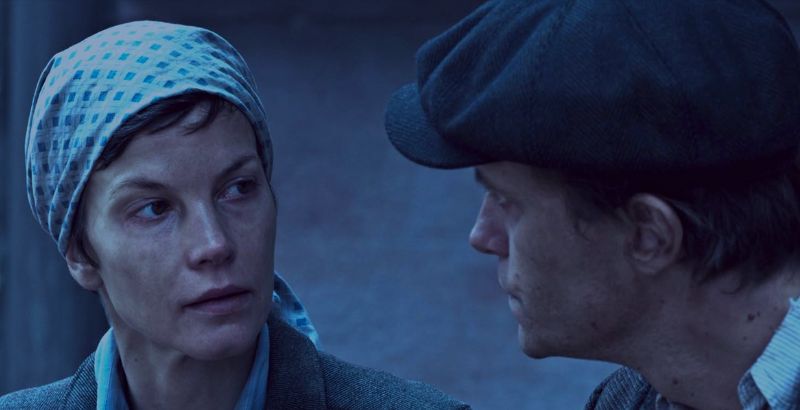
How far does the principle of an eye for an eye go? If your whole family, your friends, and the vast majority of everyone you have ever known were murdered for no reason whatsoever, would you be entitled to revenge? Would you have the gaul to commit it? That’s basically what Plan A asks, a film by Doron Paz and Yoav Paz inspired by true events in Germany shortly after World War II where a group of about 50 Jews known as the Nakam, or Avengers, who survived the Holocaust plotted to poison 6 million German civilians as revenge for the 6 million Jews murdered by the Nazis.
Were it not based on a real piece of history, I’d find Plan A hard to get on board with. It’s not Inglorious Bastards. There is no comedy to be found here. And it’s not Defiance either. This isn’t a movie about active resistance and survival. It’s a serious, dark film about utterly broken people looking to find meaning in something senseless by seeking revenge against an entire country of people they cannot fathom as innocent when unspeakable things were done in their name. And the so-called Avengers, truly what they called themselves in real life, are more or less the heroes of this tale. It’s not a movie interested in the laborious contemplation of morality. Its plot drives forward with little pause for well over an hour and a half, surely intending to give the viewer pause along the way, but it feels more like a thriller than a drama the majority of its runtime.
The question it raises along the way is most definitely astute. And it does manage by the end to give you enough perspective to draw fairly sound conclusions about the line between righteous justice and blind fury. But it’s also difficult to watch this movie make constant reference to the fact that its Jewish characters can, at any point, choose to pick up and leave to start new lives in “Palästina” instead of committing senseless across Germany without ever acknowledging the fact that doing so would ultimately result in a different set of atrocities in a different place for a different purpose.
The characters exclusively referring to Mandatory Palestine as “Palästina” when nary any other German parlance is distracting. This feel like a choice made for political reasons above anything else, which only draws more attention to the glaring omission of all of the history entangled with Israel’s establishment and its existence thereafter. It’s impossible for the filmmakers to draw such attention to the subject of Palestine in the movie without having Palestine in real life weigh on the mind, given it’s a movie about senseless killing, whether regular, everyday bystanding people were culpable, and whether and how they should be punished for that. A shoehorned line “welcome to the Haganah” evokes a similar nationalism rather than an adherence to the characters’ actual relationships to the real Haganah.
There’s absolutely nothing wrong to me with Plan A centralizing the ongoing Zionist movement, the push from all kinds of European Jews to encourage other Jews to move to Palestine and start new lives, or the fight to establish a Jewish state where Jewish people could be safe and self-determined in the wake of the Holocaust and thousands of years of persecution prior. This is all historical, an integral part of the story of post-Holocaust Jewry, and unto itself, rings true and fair to me. In fact, I appreciate the way the movie frames choosing to live and prosper as a Jewish community as the ultimate revenge against Hitler and the Nazis. It’s a side to the story of post-war Zionism that is easily forgotten in modern discourse. The language used around this undercurrent is just unnecessarily pointed and ultimately distracting.
The movie’s means of demonstrating how a group of Jewish survivors could come to such a violent and wretched end of attempting mass murder on civilians is generally well done. You can empathize with the characters’ desires even if you can’t agree with them and possibly even abhor them. The horrors of the Holocaust and the psyche of its survivors are on a somewhat rare display in Plan A as they’re delicately portrayed without being too gratuitous or underplayed at once.
The film itself is just much too dark and poorly mixed, making it quite hard to see or hear what is going on for much of the movie, especially when subtitles are not available. With slight accents to most speakers, despite speaking English, I found it hard to understand much of what was being said on account of them just being hard to hear. And the “WWII filter” on top of the poor lighting left the film visually uninteresting as well. The driving plot is enough to get you from start to finish with curiosity, but the production itself leaves quite a bit to be desired.
Despite some distracting scripting choices and a lifeless audio-visual experience, Plan A is fine enough as a film demonstrating an unbelievable history in a post-Holocaust time period rarely touched upon in film. When it does draw on the emotions of unspeakable tragedy and the natural human responses, it generally succeeds. But since it seeks to be a thriller with just fine action sequences instead of leaning into the drama with full emotional weight instead of a contrived and awkward sexual tension, it winds up fairly unremarkable.
Plan A premieres in New York City on October 7th with additional cities and VOD beginning October 14th.
Plan A
-
Rating - 6.5/106.5/10
TL;DR
Despite some distracting scripting choices and a lifeless audio-visual experience, Plan A is fine enough as a film demonstrating an unbelievable history in a post-Holocaust time period rarely touched upon in film. When it does draw on the emotions of unspeakable tragedy and the natural human responses, it generally succeeds.






